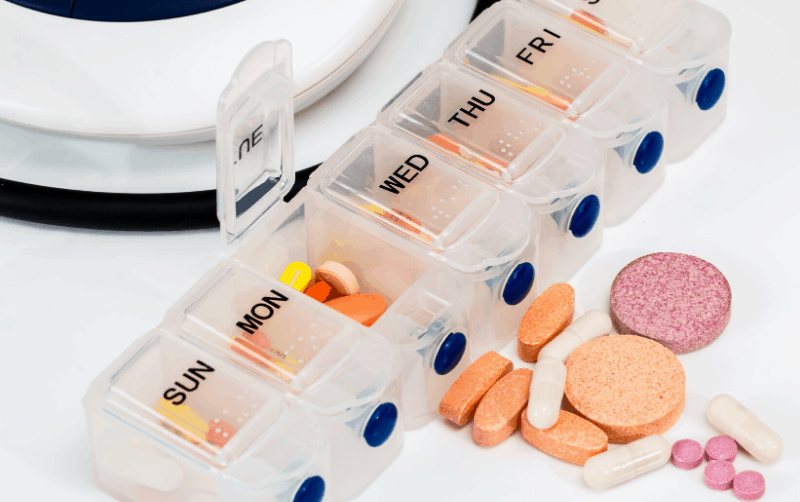When you walk down the supplement aisle, you’re met with shelves upon shelves of countless pills, capsules, and powders from dozens of different brands – it’s enough to make anyone’s head spin.
How are you supposed to know which supplements you can trust and which ones are better left on the shelf?
When it comes to choosing the right supplements, quality matters – a lot. So today we’re diving into how to ensure you’re choosing only the highest quality supplements.
Wondering if you even need them if you are eating healthy?
Of course, a healthy well-rounded diet sets the foundation for getting adequate nutrients. But even the best diet can miss the mark. In fact, the majority of Americans aren’t even getting the minimum recommended amount of many essential nutrients.1 This deficiency can be attributed to several factors:
- High intake of processed foods
- Agricultural practices that deplete nutrient levels in the soil that our food is grown in2
- An increased prevalence of chronic health conditions that impact nutrient needs3
- Rising exposure to toxins that further deplete the body of nutrients
Nutrient deficiencies can wreak havoc on the body. This is where supplements come in. Taking daily supplements can fill the gap and give your body the support it needs to function optimally.
But Do You Really Know What’s in Your Supplements?
One of the major issues when it comes to supplements is that they’re not regulated in the same way that prescription drugs are. In general, supplement manufacturers are responsible for ensuring their own products are safe and have accurate dosages and descriptions.4 Consequently, more inconsistencies slip through the cracks and you can end up with something that’s entirely different than what you signed up for.
Studies have found that some low-quality supplements may:5,6
- Be contaminated with common allergens like gluten, soy, or corn
- Contain potentially harmful contaminants or contain remnants of other drugs
- Have inaccurate and/or inconsistent dosage
- Not even contain the listed active ingredients
While there are plenty of cheap and inferior supplements out there, the good news is there are also lots of trustworthy supplements available. Let’s review key areas to focus on that will help you to exactly decipher the difference between low- and high-quality supplements.
How to Pick Quality Supplements
When it comes to choosing your supplements there are several things I recommend looking for including:
- The quality of ingredients
- Whether they’ve been independently tested
- Bioavailability
- Transparency in labeling
- Company reputation
Let’s dive a little deeper into each of these components of a quality supplement.
Choose Supplements With Quality Ingredients
Low-quality supplements can be chock full of fillers and additives. Look for supplements that contain minimal and pure ingredients. Avoid supplements that contain any common allergens that are often used in lower quality products such as:
- Gluten
- Dairy
- Eggs
- Soy
- Shellfish
- Artificial preservatives
- Artificial colors
- GMO’s
Be sure to thoroughly read the ingredients list. And if there are any ingredients you don’t recognize or aren’t sure of, do some research to ensure it’s not an unnecessary additive.
Now you might be wondering exactly how you’re supposed to trust the ingredient list when I just told you that some supplements have completely false labeling. That’s where independent lab testing comes in.
Choose Supplements That Are Independently Tested
Considering some supplement companies have been known to cut corners and put out inferior and misleading products, it can be challenging as a consumer to know who to trust. Fortunately, there are independent testing labs that vigorously inspect and evaluate the quality of supplements.
These third-party organizations inspect supplements and the manufacturing practices used to produce them to ensure they are adhering to quality standards. Look for a seal of approval from respected third-party labs such as:
- ConsumerLab
- NSF International
- U.S. Pharmacopeia
These organizations exist to provide consumers with the information they need to make informed decisions. A seal of approval from any one of these organizations ensures you're getting a quality product.
Choose Supplements That Are Bioavailable
Bioavailability is the extent that a substance can be absorbed and made available for use by the body. Many vitamins and minerals can come in different forms. The body absorbs these varying forms of supplements in different ways, leading to having varying effects on the body. For example, magnesium may come as:7
- Magnesium oxide
- Magnesium lactate
- Magnesium citrate
- Magnesium chloride
When choosing supplements, I recommend doing a little research to figure out what form best meets your needs. If you’re not sure where to start, it might be a good idea to consult with an experienced integrative and functional medicine practitioner.
Choose Supplements That Label All Ingredients
Quality supplement labels should list every single ingredient – both active and inactive. Manufacturers that list vague ingredients like “proprietary blend” or “natural flavors” are more than likely hiding less than ideal ingredients. Avoid any products from manufacturers that don’t practice transparency in their labeling.
Choose Supplements With a Good Reputation
Choose supplements that have a trusted reputation and positive reviews. A good reputation, backed by reviews and recommendations, is usually a sign of quality. I recommend checking the manufacturer’s website or their online reviews.
If you’re new to supplements or looking to explore some new products, it might also be a good idea to do so under the guidance of a practitioner well versed in supplements. Most integrative and functional medicine practitioners have excellent knowledge and understanding of supplements and would be able to offer reputable recommendations.
What Are the Best Supplement Brands?
With lots of confusing information and misleading products out there, it may seem overwhelming and even a little intimidating when it comes time to choose a high-quality supplement. But there are many supplement brands that adhere to only the highest standards and produce top-notch products.
It may feel overwhelming and intimidating when it comes to choosing high-quality supplements – that's why I created my own brand that you can trust! I’ve already done the homework for you.
Some of my favorite brands include:
- Dr. Jill Health
- Thorne Research
- Klaire Labs
- Pure Encapsulations
- Quicksilver Scientific
- Megasporebiotic
- Bio-botanical Research
- Metagenics
- Designs for Health
- Orthomolecular Research
You can access all of my favorite and most trusted supplement brands through my online store by clicking right here. And you can even get 10% off your first order!
Putting It All Together
Supplements are one of the most powerful tools we have when it comes to health. I personally use supplements and recommend them to my patients all the time. They fill nutrient gaps, mitigate imbalances, and help your body function at optimal levels.
But when it comes to choosing supplements, quality is everything. Use the tips outlined in this article to ensure you’re choosing only the best products so you can reap all the benefits of your supplements.
Now it’s time to hear from you. Were you surprised to learn that there’s so much variation in the quality of supplements? What steps are you taking to ensure you’re choosing high-quality supplements? Leave your questions and thoughts in the comments below!
References
- https://www.ncbi.nlm.nih.gov/pmc/articles/PMC5537775/
- https://pubmed.ncbi.nlm.nih.gov/15637215/
- https://www.ncbi.nlm.nih.gov/pmc/articles/PMC3601187/
- https://www.ncbi.nlm.nih.gov/pmc/articles/PMC521528/
- https://www.gao.gov/assets/700/695049.pdf
- https://www.accessdata.fda.gov/scripts/sda/sdnavigation.cfm?sd=tainted_supplements_cder
* These statements have not been evaluated by the Food and Drug Administration. The product mentioned in this article are not intended to diagnose, treat, cure, or prevent any disease. The information in this article is not intended to replace any recommendations or relationship with your physician. Please review references sited at end of article for scientific support of any claims made.
















6 Comments
PROBLEM THAT MANY OF US HAVE IS COMPANIES SAY HOW GOOD THEIR PRODUCTS ARE LIKE VIT. AND HERBAL SUPPLEMENTS, YET THEY DO NOT TELL US IF ANY THING THEY SELL HAS COME FROM CHINA….MANY TIMES I HAVE
HAD TO SEND A COMPANY AN EMAIL TO ASK IF ANYTHING IN THEIR PRODUCT OR PRODUCTS HAVE COME FROM CHINA AND SURE ENOUGH THEY HAD INGREDIENTS FROM CHINA! I THINK MIKE ADAMS IS THE ONLY ONE THAT TELLS US
UP FRONT THAT HIS PRODUCTS DO NOT HAVE ANYTHING FROM CHINA…..
I have heard the common additive, magnesium stearate in the long run is harmful to the digestive track. I noticed nearly all supplements contain this additive Including many of the ones you mentioned. What are your thoughts on this common additive which has no nutritional value? Thank you
Hi Antonia
Many professional grade companies no longer use magnesium stearate but I do not think it causes serious damage
warmly
Dr. Jill
Hi Antonia
Many professional grade companies no longer use magnesium stearate but I do not think it causes serious damage
warmly
Dr. Jill
love Xymogen
Hi Dr. Jill,
I’m hoping you can help. My daughter and I have seen numerous doctors and are very frustrated. She has Hashimoto’s and she also has significant bloating. We decided to go gluten free. She’s been gluten free for 2 years, but we didn’t realize that something she was eating every day could have gluten in some batches and between that food combined with restaurant eating, she was glutened a lot 😠 She’s now been officially gluten free for over a month. During the 2 years, her TPO antibodies dropped from over 1,000 to 474. She’s had improvement in her bloating, her vision, her nutrient absorption (except for iron). So it’s helped her significantly and clearly she has an issue with it so we aren’t going to ever reintroduce it. But the issue is she’s still having bloating. Not as bad as before but it’s still an issue. She bloats from the front and out to the sides (muffin top appearance). It’s always there but for some reason, it gets significantly worse when it’s her time of the month. She doesn’t have any constipation or diarrhea with the bloat. In addition, her legs are swollen. I’m not sure if that’s related to the bloating or not. Every once in a while (rare occasion), her legs and stomach will look really good and a lot better. But we can’t figure out what’s going on to cause this. She’s on day 2 of a dairy free diet. Not sure if that’s an issue. We’re just guessing here. She’s still bloated and her legs are still swollen. Although it’s her time of the month so it’s really difficult to tell if it’s working. Please help!
Share: